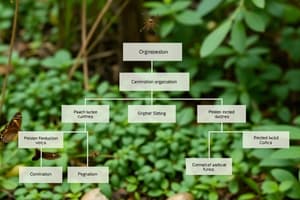Podcast
Questions and Answers
What is the scientific study of life and living organisms called?
What is the scientific study of life and living organisms called?
Biology.
List the hierarchical levels of biological organization starting from atoms.
List the hierarchical levels of biological organization starting from atoms.
Atoms, molecules, macromolecules, organelles, cells, tissues, organs, organ systems, organisms, populations, communities, ecosystems, biosphere.
What are the defining characteristics of life?
What are the defining characteristics of life?
Organization, metabolism, growth and development, adaptation, response to stimuli, reproduction, and homeostasis.
Name two branches of biology and briefly describe them.
Name two branches of biology and briefly describe them.
How do living organisms maintain a stable internal environment?
How do living organisms maintain a stable internal environment?
Flashcards
Biology Definition
Biology Definition
The scientific study of life and living things, including their structure, function, growth, evolution, and distribution.
Biological Organization Levels
Biological Organization Levels
A hierarchical system, from atoms to biospheres, that shows how living things are structured. Atoms to molecules, molecules to cells, and so on.
Defining Characteristics of Life
Defining Characteristics of Life
The key features that distinguish living things: organization, metabolism, growth, adaptation, response to stimuli, reproduction, and homeostasis- All living things exhibit these.
Branch: Molecular Biology
Branch: Molecular Biology
Signup and view all the flashcards
Branch: Ecology
Branch: Ecology
Signup and view all the flashcards
Study Notes
Introduction to Biology
- Biology is the scientific study of life and living organisms, including their structure, function, growth, evolution, distribution, and taxonomy.
- It encompasses a vast range of topics, from the molecular processes within cells to the interactions of organisms within ecosystems.
- Biology is a multifaceted field, drawing on other scientific disciplines like chemistry, physics, and mathematics.
Levels of Biological Organization
- Biological systems are organized in a hierarchical fashion, ranging from atoms to biospheres.
- Atoms combine to form molecules, which assemble to create macromolecules.
- Macromolecules then form organelles, the fundamental units within cells.
- Cells make up tissues, which form organs, which form organ systems, which compose organisms.
- Organisms interact within populations, communities, and ecosystems, forming the biosphere.
- Understanding these levels of organization is crucial to grasp the complexity of life's processes.
Defining Characteristics of Life
- All living organisms share several key characteristics:
- Organization: Living organisms exhibit complex organization at multiple levels.
- Metabolism: They acquire and use energy for their life processes.
- Growth and Development: They increase in size and complexity.
- Adaptation: They evolve to better suit their environment.
- Response to Stimuli: They react to changes in their surroundings.
- Reproduction: They produce offspring similar to themselves.
- Homeostasis: They maintain a stable internal environment.
Branches of Biology
- Biology is broadly categorized into various branches, each focusing on specific aspects of life:
- Molecular Biology: Studies the structure and function of biomolecules.
- Cell Biology: Focuses on the structure and function of cells.
- Genetics: Investigates inheritance and variation in living organisms.
- Ecology: Studies the interactions between organisms and their environment.
- Evolutionary Biology: Examines the processes of evolution and adaptation.
- Physiology: Investigates the functions of organisms and their organ systems.
- Microbiology: Studies microscopic organisms.
- Botany: The branch of biology that studies plants.
- Zoology: The branch of biology that studies animals.
Basic Biological Concepts
- The scientific method: A systematic approach to investigating natural phenomena through observation, hypothesis formation, experimentation, and analysis.
- The cell theory: All living things are composed of cells, cells are the basic units of life, and new cells arise from pre-existing cells.
- DNA: Deoxyribonucleic acid, the molecule that carries the genetic instructions for all living organisms.
- Evolution by natural selection: The process by which organisms better adapted to their environment tend to survive and produce more offspring.
- Homeostasis: The maintenance of a stable internal environment in living organisms to sustain life processes.
Applications of Biology
- Biology has significant practical applications in various fields including:
- Medicine: Treatment of diseases and understanding human physiology.
- Agriculture: Improving crop yields and livestock production.
- Biotechnology: Development of new technologies and products using biological systems.
- Environmental science: Understanding and protecting ecosystems.
- Conservation biology: Protecting endangered species and their habitats.
- These applications are crucial for addressing global challenges and improving human well-being.
Studying That Suits You
Use AI to generate personalized quizzes and flashcards to suit your learning preferences.




